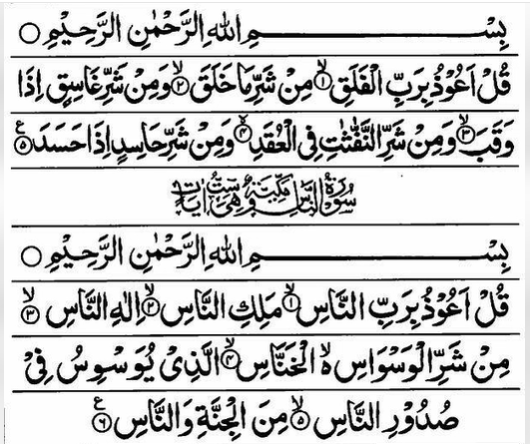
What is Al-Mu’awwidhatayn?
There are two surahs at the end of the Holy Quran which carry great blessings and virtue. These surahs are called Al-Mu’awwidhatayn (or Al-Muawwidzatain). In Arabic, it is written as المعوذتين and consists of Surah Falaq and Surah Nas.
Al-Muawwidhatayn means “the two verses for seeking refuge”, and this is because both Surah Falaq and Surah Nas start with “Say: I seek refuge in the Lord of…”. They are the 113th and 114th surahs of the Quran and are used to seek protection against evil and illnesses.
Surah Ikhlas in Arabic – Benefits and Rewards
| Surah Falaq | Surah Nas | |
|---|---|---|
| Place of Revelation | Makki | Makki |
| Chapter | 113 | 114 |
| Number of verses | 5 | 6 |

Translation and Transliteration of Al-Mu’awwidhatayn
Translation of Surah Falaq
- Say, “I seek refuge in the Lord of daybreak
- From the evil of that which He created
- and from the evil of the night when it grows dark,
- and from the evil of those [witches casting spells by] blowing onto knots,
- And from the evil of an envier when he envies.”
Transliteration of Surah Falaq
- Qul a’oozhu bi rabbil-falaq
- Min sharri maa khalaq
- Wa min sharri ghaasiqin izhaa waqab
- Wa min sharrin-naffaa-thaati fil ‘uqad
- Wa min sharri haasidin izhaa hasad
Translation of Surah Nas
- Say, “I seek refuge in the Lord of mankind,
- The Master of humankind,
- The God of mankind,
- from the evil of the lurking whisperer –
- Who whispers [evil] into the hearts of mankind –
- from among jinn and humankind.”
Transliteration of Surah Nas
- Qul a’oozhu birabbin naas
- Malikin naas
- Ilaahin naas
- Min sharril waswaasil khannaas
- Allazhee yuwaswisu fee sudoorin naas
- Minal jinnati wannaas
Explanation of Al-Mu’awwidhatayn
Imam Baihaqi in Dala’il an-Nubuwwat has written that these Surahs were revealed together, that is why the combined name of both is Al-Mu’awwidhatayn.
When the Holy Prophet SAW greatly disappointed the disbelievers of Makkah by refusing to make any type of faith-based compromise with them, and in Surah Al-Kafirun they were plainly told: “I do not worship those who you worship nor are you worshipers of Him Whom I worship. For you is your religion and for me is mine”, the amount of hatred reached new heights.
Families whose members (men or women, boys or girls) had adopted Islam were enraged by the Holy Prophet from within. They were cursing him, conducting secret meetings to assassinate him discreetly, so that the Bani Hashim would not be able to track down the killer and exact vengeance; sorcery and spells were being used against him to bring about his death, or cause him to become ill or insane; satans from among the men and the jinn spread on all sides, whispering one or another evil into the minds of the people against him and the Qur’an brought by him, causing them to distrust him and flee. Many people were envious of him because they couldn’t stand it if a man from a different family or clan flourished and rose to prominence.
For example, Abu Jahl himself has described why he was going to such extremes in his hatred for him:
“We and the Bani Abdi Manaf (to which the Holy Prophet belonged) were rivals of each other: they fed others, we too fed others; they provided conveyances to the people, we too did the same; they gave donations, we too gave donations, so much so that when they and we have become equal in honor and nobility, they now proclaim that they have a Prophet who is inspired from the heaven; how can we compete with them in this field? By God, we will never acknowledge him, nor affirm faith in him”.
(Ibn Hisham, vol. I, pp. 337-338).
Benefits of Al-Mu’awwidhatayn
- Reciting these two surahs protects you from all evil
- Praying muawwidhatayn before sleeping and blowing into your hands, then rubbing over your body keeps illnesses away
- They are the best chapters of the Quran to recite
- Allah loves it when one reads these two surahs, especially surah Al-Falaq
- Reciting them three times in the morning and afternoon will suffice us from all bad things or everything
- Recite Surah Falaq and Surah Nas to be protected from the Jinn
- Ruqyah is best done when using Al-Mu’awwidhatayn
Hadith on Al-Mu’awwidhatayn
Uqbah bin Amir Al-Juhni narrated that:
the Prophet said: “Allah has revealed to me Ayat the likes of which have not been seen: “Say: I seek refuge in the Lord of mankind…” until the end of the Surat. “Say: I seek refuge in the Lord of Al-Falaq…” until the end of the Surat.
Tirmidhi
Abdullah bin Khubaib (May Allah be pleased with him) reported:
The Messenger of Allah (ﷺ) said to me, “Recite Surat Al-Ikhlas and Al- Mu’awwidhatain (Surat Al-Falaq and Surat An-Nas) three times at dawn and dusk. It will suffice you in all respects.”
Abu Dawud and At-Tirmidhi
Surah Fatiha (6 Benefits, English Translation & Transliteration)
Narrated ‘Aisha:
Whenever the Prophet (ﷺ) went to bed every night, he used to cup his hands together and blow over it after reciting Surat Al-Ikhlas, Surat Al-Falaq and Surat An-Nas, and then rub his hands over whatever parts of his body he was able to rub, starting with his head, face and front of his body. He used to do that three times.
Bukhari
Abu Sa’id Al-Khudri RA reported:
The Messenger of Allah (ﷺ) used to seek protection against the evil of jinn and the evil eyes till Surat Al-Falaq and Surat An-Nas were revealed. After they were revealed, he took to them for seeking Allah’s protection and left everything besides them.
Tirmidhi
Narrated `Aisha:
During the Prophet’s fatal illness, he used to recite the Mu’auwidhat (Surat An-Nas and Surat Al- Falaq) and then blow his breath over his body. When his illness was aggravated, I used to recite those two Suras and blow my breath over him and make him rub his body with his own hand for its blessings.” (Ma`mar asked Az-Zuhri: How did the Prophet (ﷺ) use to blow? Az-Zuhri said: He used to blow on his hands and then passed them over his face.)
Bukhari
Auf bin Malik al-Ashjal said:
“We used to practice blowing to cure diseases. We asked the Holy Prophet (upon whom be peace) for his opinion in this regard. He said: Let me know the words with which you blow over the people. There is no harm in blowing unless it smacks of polytheism.”
Muslim



